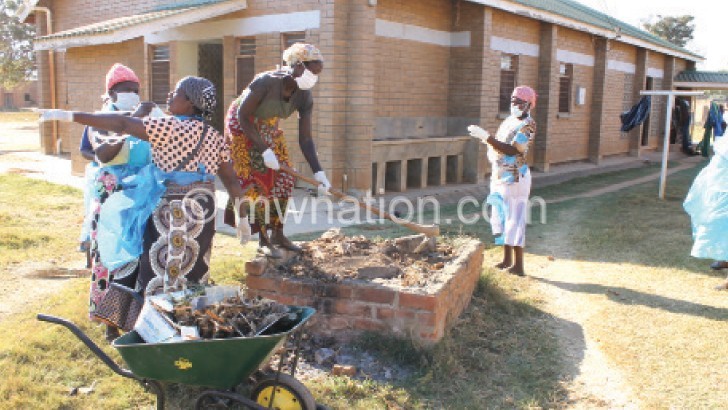Bolero Health Centre still filthy
Fear has engulfed patients and pregnant women in Rumphi West due to unending unsanitary conditions at Bolero Health Centre.
Nearly 45 000 Malawians rush to Bolero, almost 32 kilometres from Rumphi District Hospital, in search of healing.
However, the people in pain fear for their lives as poor hygiene and sanitation puts them at the risk of contracting more devastating infections.
Surrounded by Jacaranda trees, the rural health facility welcomes visitors with shocking encounters with mounds of dirt all over the place, a pungent smell and impenetrable bushes surrounding crumbling toilets and burnt shrubbery.

The pitiable situation recently pushed Tovwirane Women’s Group to intervene. To ease the problem, the well-wishers are cleaning up filthy patches that blight the health centre.
The 100-square-metre facility is served by two ground labourers who sometimes do diagnostic and other specialised jobs meant for nurses, pharmacists, clinical officers and other skilled health workers.
“It is strange that they seldom carry out their duty of keeping the hospital clean, but eagerly take down notes into patients’ health passports. Sometimes, they distribute drugs. This puts lives in danger,” bemoans Tovwirane chairperson Tiwonge Gondwe.
To her, the neglected untidiness constitutes a “serious problem” that needs to be eliminated immediately.
“The two ground labourers are untouchable. They are rude to community members crying for sanity at the health centre. A lot needs to be done on this hospital,’’ she said.
Last year, Wisdom Nyimbili, the in-charge of Bolero Health Centre, blamed “the rude ground workers” for holding the clinic at ransom.
This sums up the malaise at the health centre which has no running water.
Patients and staff rely on an overwhelmed borehole which often runs dry and breaks down.
There is no electricity in the maternity ward. No lights. No bathrooms. Pregnant women walk 100 metres to take a bath in toilets after delivery.
The water and sanitation crisis silently compels some pregnant women to deliver at home amid nationwide efforts to ensure no woman gives birth without skilled attendants in sight.
Up in smoke is the campaign to ensure every baby is born in safe clinical conditions.
Bolero Health Centre has 12 new toilets, but only two are functional.
The rest are either overgrown or sinking in. People are afraid of plunging into the pits.
The wrecked pit latrines expose poor workmanship and lack of maintenance.
As the clean-up gets momentum, community members and humanitarian agents at Tovwirane say they are sick and tired of the hypocrisy and risky breakdown in water and sanitation services s.
“The hospital is setting a bad example,” Gondwe says. “Health workers preach the importance of safe water and sanitation, but their workplace remains filthy and stinking.
The neglected spots are no new eyesores.
They were equally stinking last year when TNM donated 20 beds and mattresses at the health centre where patients still use old mattresses which are few and smelly.
“What hygiene are they talking about if they cannot practise what they say? If this continues, patients will catch infections when they visit the hospital” she says.
The ongoing clean-up follows a meeting attended by chiefs, ward councillor and health workers’ representatives.
It is ironic Bolero Health Centre cries for more toilets while nursing white elephants in an impenetrable bush, traditional leaders say.
When the Chinese constructed modern toilets at the facility, they wanted the wellbeing of the sick to improve.
The patients’ lives were in danger of avoidable infections caused by poor sanitation and hygiene as they scrambled for few filthy pit latrines that were falling apart.
Presently, the dewy pathways to the crumbling latrines speak of neglect.
The healing place has become a breeding ground for malaria, diarrhoea and other preventable diseases.
“It’s a disgrace,” says Bolero Health Advisory Committee chairperson Sarah Mughogho. “The neglected toilets were supposed to improve the welfare of patients, but nobody seems to care about them. We need to do something.”
Her committee strengthens ties between health workers and the locals to improve service delivery.
Last year, she told The Nation that the health facility resembles “no-man’s land”.
“The toilets are far away. Patients struggle to access them, especially at night,” she says.
Life is tough for in-patients, but caring for available facilities seems tougher.
Unfortunately, the victims of unsafe sanitation facilities are sick Malawians who can bear no more illnesses.
“Mosquitoes torture us day and night, snakes are common. The bush is risky,” a patient said in an interview at the guardian shelter.
Nearby, pregnant women were seen entering and leaving the old toilets which were equally unhygienic, with no doors, roofs and water for hand-washing.
And councillor Dad Butao asked for requisite tools, especially “mops and slashers”.
“The health centre lacks many things as the district health office often shuns rural facilities, favouring the district hospital. Cleaners say they use their own tools to keep the public facility clean.”
Built in the 1980s, the health centre serves almost 45 000 people in Nkhamanga Valley. It sees up to 200 cases daily. n
Extra reporting by James Chavula





